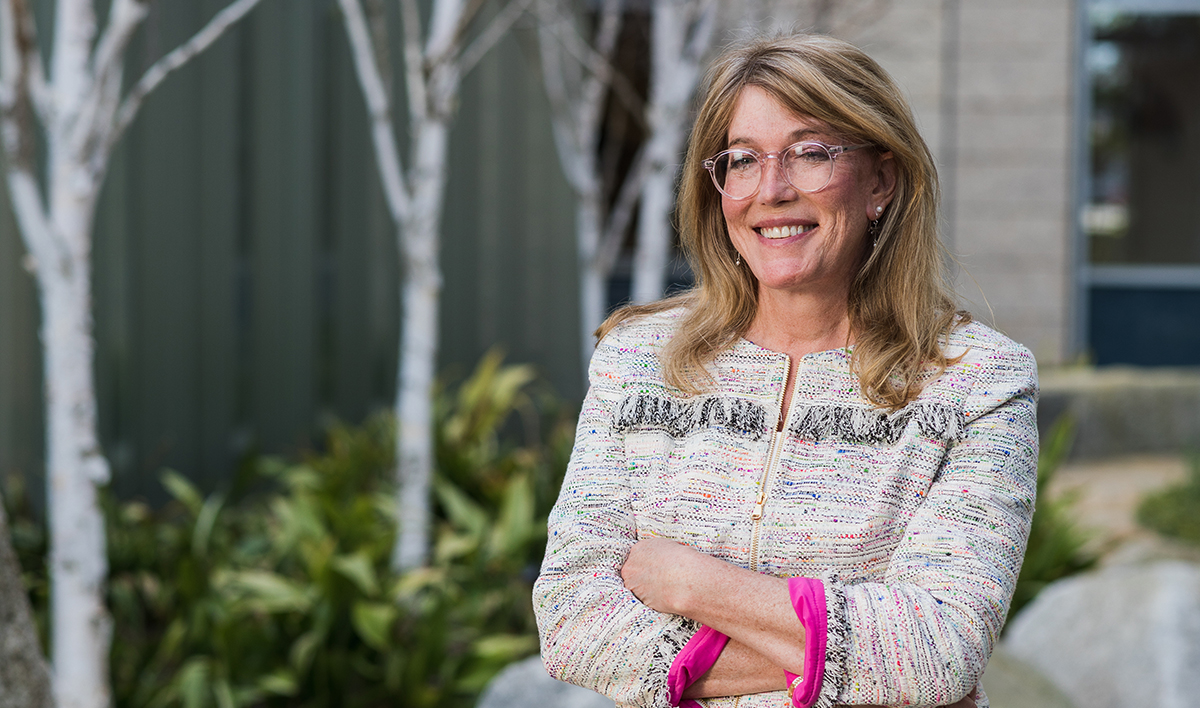
For Transgender Patients, a Surgeon Who Understands
With personal history and medical prowess, Marci Bowers ’80 is a leader in sex reassignment surgery.
It’s late January, and Marci Bowers ’80 has completed sex reassignment surgeries on two patients at Mills-Peninsula Medical Center in Burlingame, California. A visiting plastic surgeon from Seattle is shadowing the procedures, gleaning tips from one of the undisputed experts in the field.
Bowers is in high demand for her skill: she’s performed more than 2,300 sex reassignment surgeries during her career, 90 percent of them male-to- female procedures. But she also has a deeply personal connection to her work: she is a transgender woman herself, one of just three transgender doctors in the country performing the surgery.
Treatment for gender dysphoria — the conflict between one’s assigned sex at birth based on external anatomy and the gender with which one identifies internally — is medically necessary, according to the American Medical Association. It can involve physical changes to the body, such as hormone treatment or sex reassignment surgery. Surgery is a personal decision for transgender people: some pursue it for their fulfillment, while others decide against it or can’t afford it during their transition.
With increasing societal acceptance and medical recognition, some transgender people are starting to gain better access to sex reassignment — also known as gender confirmation — surgery. Surgical costs can exceed $100,000, and until recent years, private insurance companies have been reluctant to cover them. Yet Bowers has accrued a four-year waiting list for her services.
For her patients, she’s worth the wait. Ariana Palacios, a 28-year-old flight attendant, consulted with a couple of surgeons before she met Bowers. While she did not feel at ease with others, she found that Bowers projects a special feeling of friendship and comfort. “To me, she’s an artist and a genius,” says Palacios, who traveled from her home in Washington, DC, to California to have the surgery.
Bowers is helping her patients to live authentically. “Today, I’m free, I’m confident, and, of course, I’m happy,” adds Palacios, one of an estimated 1.4 million transgender Americans.
Boosting happiness is a big deal. Transgender people remain among the most vulnerable citizens in society, facing staggering rates of harassment, discrimination, and violence. Results from the 2015 U.S. Transgender Survey are alarming: 39 percent of respondents were facing serious psychological distress from mistreatment or harassment; 30 percent were living in poverty, double the rate of the general population; another 30 percent had suffered recent discrimination in the workplace or in public; and 40 percent had attempted suicide in their lifetimes, nine times the rate of the general population.
Bowers believes in the powers of visibility and education. After starting a transgender surgical program at Denver Health in Colorado, she’s now helping to create a transgender fellowship for plastic surgeons at Mount Sinai Hospital in New York. The University of Toronto recently gave Bowers an honorary teaching position, and she hopes to launch a program in gender confirmation surgery at its medical school. She also started a surgical program in Tel Aviv, Israel.
“An activist is someone who speaks and stands up for what they believe, and that’s what I’m doing,” Bowers says.
On this winter day in Burlingame, Bowers processes the latest headline. Less than 24 hours earlier, the U.S. Supreme Court revived the Trump administration’s ban on transgender people serving in the military. She summons the words of Martin Luther King Jr. “The arc of the moral universe bends in the direction of justice,” she says optimistically.
But she’s clearly upset. The ban, she says, is born of “the fear of a few not-very-enlightened people, and unfortunately, that’s who we put on the Supreme Court sometimes.
“The truth,” she continues, “is [that being] transgender is an important part of the world, and it’s not going away.”
Transitioning is an unfolding process. It varies from person to person and can involve any combination of personal, medical, and legal steps — self- acceptance, external expression, coming out to others, updating one’s name and sex on legal documents, having hormone therapy, and electing surgery.
By age four, Bowers knew she was different. But her journey would be decades long.
“I don’t identify as a transgender woman. I’m a woman who has a transgender history.”
— Marci Bowers
She was born Mark Bowers 61 years ago in Oak Park, Illinois, at the same hospital that gave the world Ernest Hemingway. She was the target of bullies in high school — “because I was so slight and feminine appearing,” she says.
The oldest of four siblings, Bowers spent a mostly happy childhood in Oconomowoc, Wisconsin, the child of a stay-at-home mom and a furniture-salesman father. When Bowers transitioned at age 37 — while married and with three children — it cast a years-long chill on her relationship with her parents. It wasn’t until Bowers’s father was dying of cancer that they reconciled.
At 19, Bowers hitchhiked to San Diego in hopes of transitioning and expressing herself as a woman. Instead, she got caught up in the Unification Church (whose followers are known as “Moonies”) — a cult, she says, that she later escaped.
“I had no prospect for paying for anything, let alone surgeries,” Bowers recalls. “I decided I would go back to Wisconsin. Next thing you know, I’m in college, I’m in medical school, and I’m married. I was a pretty classic case [of denial], I’d say.”
In Madison, the science-minded Bowers earned a degree in medical microbiology. It was “a really solid educational foundation” for her later work, she says.
Bowers remains married to her wife. After the birth of their third child, “there was a lot of angst,” she recalls. “I just couldn’t go on without making [the transition] happen. I was trying to live this false life, being a family man. I was living for others and being who I wasn’t.”
At that point, Bowers was a mid-career ob-gyn in Seattle, having delivered some 1,300 babies. In 2003, she relocated to the hinterlands of Trinidad, Colorado, which had been known since the 1970s as “The Sex Change Capital of the World” because of the prolific surgeon Stanley Biber. She learned surgical techniques under the tutelage of the late Biber, considered one of the earliest and foremost practitioners of sex reassignment surgery. She eventually took over his practice in the small town of fewer than 10,000 residents until she moved to California.
At 5-foot-4, Biber was a stubby figure, “but he stood absolutely upright,” Bowers recalls. “He was very vertical, very proud. He had a swagger.” To Bowers, Biber looked remarkably like her own father. She projects some of her mentor’s toughness to this day.
Bowers’s national profile rose this past year with her appearance on TLC’s I Am Jazz, a popular reality show in which she operates on transgender teen Jazz Jennings. Reflecting on her own journey, Bowers says, “I don’t identify as a transgender woman. I’m a woman who has a transgender history.”
In addition to sex reassignment surgeries, Bowers has performed more than 500 clitoral restoration procedures for victims of female genital mutilation. She’s performed operations on immigrant victims at her practice, and in March, she partnered with the San Francisco–based nonprofit Clitoraid to travel to Kenya and offer her services to victims there while also training other surgeons.
“This is a seismic event in a continent that is beginning to deal honestly with the centuries-old cultural practice of female genital mutilation,” Bowers says, noting that it was her third trip to Africa.
“These women have been mutilated in such an intimate part of their body, and Dr. Bowers is so very sensitive to that,” adds Nadine Gary, the international director for Clitoraid. “She’s sensitive to how they feel and what they are trying to achieve.”
Bowers’s office administrator, Robin Lassiter, has held her position for 13 years. She’s typically the first point of contact for people inquiring about sex reassignment surgery, receiving calls from all 50 states and from countries around the world. They’re looking, she says, for clarity on the pathway to hormone therapy or potential surgery. And, ultimately, they’re looking for greater happiness.
“Marci is an incredible human being,” Lassiter says. “She has a very clear vision and focus, and she’s an incredibly skilled surgeon. That’s why people wait for her. That’s why she’s worth waiting for.”
Andrew Faught is a freelance writer based in California.
Published in the Summer 2019 issue



Comments
Kim June 22, 2022
Well, I had surgery August 16th, 1983. I’m married since 1991. I seriously need a doctor that knows about this. Asap. I’m 69. Isn’t there “any” capable doctors in or around New Jersey? Please, let me know. Thank you.
Harold Martin ( Haley) June 26, 2023
I’m 73 and wanting to transition but having trouble finding out how to start. I Have an session set up with a psychologist but I want to get this done. I dress as a woman and I feel so good.
Sandra Currie June 19, 2024
You are a man, Marci. Show evidence to the contrary.